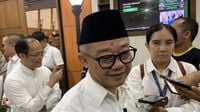The education landscape at the high school level in Indonesia is set to undergo significant changes as the government announces plans to reinstate specialization tracks in science, social studies, and language. Minister of Education Abdul Mu’ti revealed this decision during a Halalbihalal event with the Forum Wartawan Pendidikan (Fortadik) in Jakarta on the evening of April 11, 2025.
These specialization tracks—Ilmu Pengetahuan Alam (IPA), Ilmu Pengetahuan Sosial (IPS), and Bahasa—were previously eliminated with the implementation of the Kurikulum Merdeka by former Minister Nadiem Makarim. This shift aimed to avoid rigid grouping of students based on their academic strengths. However, after three years of this approach, Mu’ti acknowledged that it has not effectively prepared students for higher education.
“This is a little sneak peek: we will revive the specialization tracks. So, high school students will once again have the IPA, IPS, and Language tracks,” Mu’ti stated. He explained that the move is aligned with the upcoming implementation of the Tes Kemampuan Akademik (TKA), which is set to replace the Ujian Nasional starting in November 2025.
The TKA will be piloted for 12th-grade students, with plans to extend it to elementary and middle school levels the following year. Unlike the Ujian Nasional, which was mandatory, the TKA is voluntary and designed for students looking to strengthen their academic portfolios.
For the TKA, students will be required to take mandatory tests in Bahasa Indonesia and Mathematics, along with additional subject tests that align with their chosen specialization. For instance, students in the IPA track can select from subjects such as Biology, Chemistry, or Physics, while those in the IPS track may choose from Economics, Geography, or History.
Mu’ti expressed optimism that this new system would better identify students' academic capabilities and align them with their higher education choices. He emphasized that the TKA would serve as a more objective and standardized measurement tool for universities in selecting prospective students.
“When Nadiem’s system was implemented, some foreign universities rejected applicants from Indonesia because there was no clear benchmark for academic abilities. With the TKA, we have an instrument that can genuinely showcase students' potential,” Mu’ti added.
The government plans to formalize this policy through a new ministerial regulation, which will also repeal the existing Permendikbudristek Nomor 12 Tahun 2024 that currently governs the curriculum.
As the education system evolves, the reinstatement of specialization tracks is seen as a crucial step toward enhancing the quality of education and better preparing students for the challenges of higher education and beyond. The TKA is expected to provide a clearer framework for assessing student performance and ensuring that Indonesian students can compete effectively on both national and international stages.
In summary, the Indonesian government is taking decisive steps to improve high school education by reintroducing specialization tracks, aiming to align academic assessments with students' future educational paths. This development marks a significant shift in the educational policy landscape, reflecting a responsive approach to the needs of students and the demands of higher education institutions.

